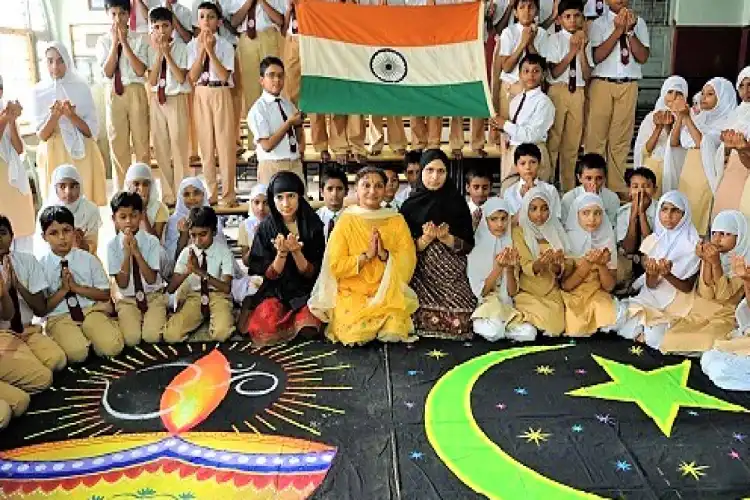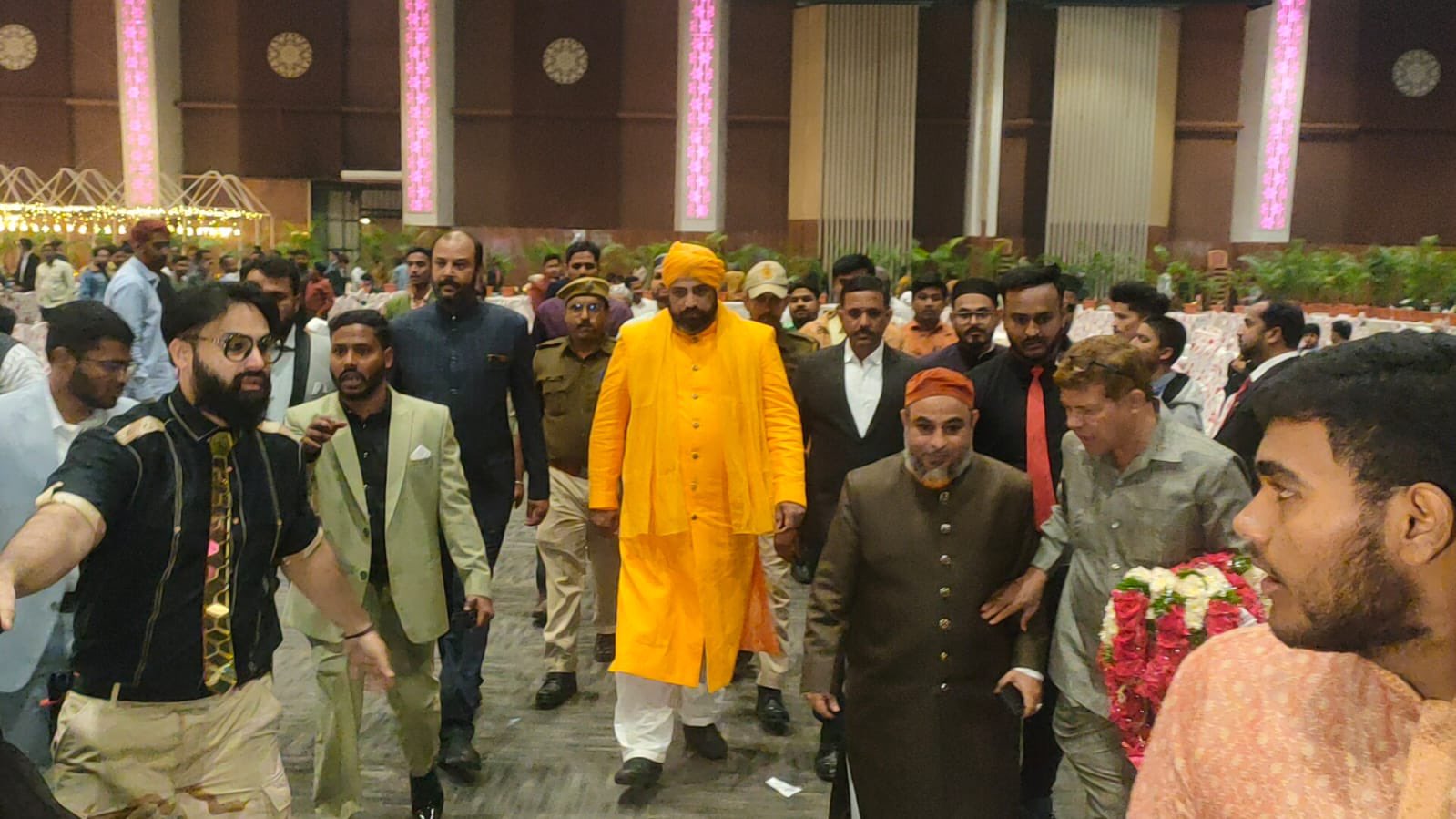
Dr. Hafeezur Rahman
Many similar examples from The Holy Qur'an and Hindu scriptures can be applied to the lives of common men and women today to sustain religious unity, peace, and harmony.
Let me explain these similarities between the Quranic verses and some Vedas/ Mantras of Hindu scripture that show how both are guiding forces of mankind to restore human values and spiritual unity because all paths lead towards the One God and he is the master, creator, and sustainer of the whole world. We call him by different names, some call him Allah, Rahman, or Raheem in Arabic, Persian call him Khuda and Parwardigar, European call him God or Lord and we Indian call him, Ishwar or Paramatma, etc. Our way of following and obeying him may look different but the intention, devotion, and target are one.
A famous Sanskrit phrase found in Hindu texts such as the Maha Upanshida, Vasudhaiva kutumbakam means the world is one family. On the same lines there is a famous Hadith of Prophet Mohammed, Al khalqu ayalullah, meaning thal all creation is a family of God.
As per Islam the best and the most concise definition of God is as given in Surah Ikhlas of the Qur’an: both the surah Ikhlas and Fatiha used to be recited in 5-time prayers every day by Muslims
Surah Ikhlas, Qul hu wallahu ahad, allah hussamad; lam yalid wa lam yulad, wa lam ya kun lahu kufwan ahad ((Say He is Allah, The One and Only; Allah, the Eternal/ Everlasting/ Absolute; Neither He begets, Nor is He begotten; And there is none, equal to Him. (Al Qur’an 112:1-4)
There are several passages in the Hindu Scriptures, which have the same meaning as Surah Ikhlas.
For example say He is Allah, The One and Only. (Al Qur’an 112:1) has a meaning which is very similar to “Ekam Evadvitiyam” “He is only one without a second.” (Chandogya Upanishad 6:2:1).
 Syed Naseruddin Chisty, follower of Khawaja Garib Nawaz spreading his message in Karnataka (Twitter)
Syed Naseruddin Chisty, follower of Khawaja Garib Nawaz spreading his message in Karnataka (Twitter)
Allah, the Eternal/ everlasting/ Absolute. Neither He begets, Nor is He begotten; (Al Qur’an 112:2-3). It has a similar meaning as: “He who knows Me as the unborn, as the beginning-less, as the Supreme Lord of all the Worlds.” (Bhagavad Gita 10:3)
and “Of Him, there is neither parents nor Lord.” (Shwetashvatara Upanishad 6:9) and there is none Equal to Him. (Al Qur’an 112:4)
A similar message is given in Shwetashvatara Upanishad and Yajurveda:
Na Tasya pratima asti (There is no likeness of Him). (Shwetashvatara Upanishad 4:19 & Yajurveda 32:3)
Remember, the Brahma Sutra of Hindu Vedanta is: ‘Ekam Brahm, dvitiya naste neh na naste kinchan.Pramatma/ Ishwar ek hi hai dusara nahi hai, nahi hai, nahi hai, zara bhi nahi hai” (There is only one God, not the second, not at all, not at all, not in the least bit).
The Qur’an too propounds monotheism. So you will find similarities between Hinduism and Islam even in the concept of God as I mentioned above about the oneness of God. here the explanation of similarities between the Gayatri mantra and surah fateha the beginning surah of the Holy Quran which is an essential part of every prayer.
Aum Bhoor Bhuwah Swaha, Tat Savitur Varenyam; Bhargo Devasaya Dheemahi, Dhiyo yon aha prachodayat (Oh God! Thou art the Giver of Life, Remover of pain and sorrow, The Bestower of happiness, Oh! Creator of the Universe, May we receive thy supreme sin-destroying light, May Thou guide our intellect in the right direction.)
Hence the Gayatri is unique in that it embodies the three concepts of stotra (singing the praise and glory of God), dhyaana (meditation) and prarthana (prayer). Gayatri Mantra (the mother of the Vedas), the foremost mantra in Hinduism and Hindu beliefs, inspires wisdom. Its meaning is that “May the Almighty God illuminate our intellect to lead us along the righteous path”. The mantra is also a prayer to the “giver of light and life” – the sun (savitur).
The Qu’ran
Bismillah Ar-Rahman Ar-Raheem; Al-hamdu lillahi Rabb il-‘alamin, Ar-Rahman Ar-Raheem, Maliki yawmi-d-Din, Iyya-ka na’budu wa iyya-ka nasta’in, Ihdina-sirat al-mustaqim; Sirat al-ladhina an’amta ‘alai-him. Ghairil-Maghdubi ‘alai-him wa la-d-dallin (In the name of Allah, the Most Beneficent, the Most Merciful. Praise be to Allah, Lord of the Worlds: The Most Beneficent, the Most Merciful: Owner of the Day of Judgment. Thee (alone) we worship; Thee (alone) we ask for help. Guide us to the straight path: The path of those whom Thou hast favoured; Not (the path) of those who earn Thine anger nor of those who go astray.
After observing this similarity between Qur'an and Vedas, between Prophets’ sayings and Hindu scripture we found many common grounds to be united. The beginning surah of the Qur'an called as mother of the Holy Qur'an and it’s akin to Gayatri mantra. Qur'an beginning surah is compulsory in every namaz while Hindus start their day with the Gayatri mantra. This is the beauty of religions and prayers that we do not pray for us alone but for mankind and entire humanity when we ask the mercy of our Lord for mankind.

Rehana Begum, a Muslim celebrating Chaat festival in Bihar
I would like to mention some more verses from the Holy Qur'an which address the unity of mankind.
Unity and brotherhood are the navigators of the same ship that brings peace to the shores. Qur'an reminds mankind of the unity of their origin, the unity of their Creator, and the unity of their purpose. Mankind is one brotherhood; and no effort must be spared in realizing this unity in the real life. If Qur'an calls for the brotherhood of Muslims, it is also aimed not at confronting the rest, but to endeavor to achieve a larger unification.
Unity is essential for every subjective. If it is for a bad cause, it spells doom; if it is for a good cause, it augurs well for posterity. Islam reminds mankind that it's the ultimate objective of unity must be to achieve, groom, and sustain peace in its entirety and that this grand aim can be realized only through total submission to God. Unity of Mankind should be sought at every stratum of organization- individual to individual, community to community, and country to country.
Further, the truth is that this nation of yours is one single nation, and I am your (only) Lord; so you must ( exclusively) worship Me. Still, they created divisions within themselves on various issues. ( remember that) everyone has to return to Us. ( 21:92-93 Quran)
Avoid divisions
Let you emerge as a nation that gives a call for the welfare of the people, implements the recognized plans of action, and effectively bans the forbidden practices. Such nations are real achievers. Moreover, be not like the nations that are divided among factions and fall into disputes despite receiving well-defined guidelines. (3: 104-105)
Qur'an also says...
O, mankind! We created you from a combination of a male and a female, and formed you into races and tribes, so that you may get introduced to one another. The noblest among you in God's view (however) is the one who is best in devotion ( to God). (49:13)
Further, collectively hold the Divine Rope, and never get divided into factions! (3:103)
Some people respond for ( the cause of) God, organize ( prayers for) Blessings, hold mutual consultation regarding their issues, and expend out of what We have provided them. ( 42:38).
Persian poet Shaikh Saadi Shirazi`s beautiful couplets on the universal brotherhood and fraternity is scripted on the United Nations wall of the UN Building in New York with its English translation, "All sons of Adam are limbs of each other, having been created of one essence. If any calamity befalls one limb, the other limbs cannot remain at rest. If you do not show sympathy for the troubles of others, you have no worth to be called a human being".
Rumi also gives an emphatic call to all human beings to come around him to spread love and brotherhood. He calls on the people; Come, come whoever you are, Wanderers, worshipers, lovers, whatever you are. It doesn’t matter. Ours is not a caravan of despair. Come, even if you have broken your vows a thousand times. Come yet again, come and come.
On the same line, the famous Sufi mystic in the Indian subcontinent Khwaja Gharib Nawaz of Ajmer has said, Love towards all and malice towards none. He further advised his disciples and followers to have, “Earth-like grace, Sun-like generosity and river-like hospitality"
However, his disciples and successors held his message by tooth and their hospices became the center of spreading universal love and affinity. His disciple, Hazrat Nizamuddin Aulya of Delhi often reminded his followers, "If people spread thorns in your path, you just put flowers in their way; otherwise the entire path would become thorny".
Urdu poet Jigar Moradabadi said beautifully, "Unka jo farz hai wo ahle syasat janein, Mera paigham mohabbat hai jahan tak pohnche".
ALSO READ: Moderate Islam is the key
Swami Vivekananda a world-famous religious mentor and thinker says, "Love is life and hatred is death".
(Dr. Hafeezur Rahman is an author, Islamic Scholar, TV host, and the founder of the Sufi Peace Foundation)
